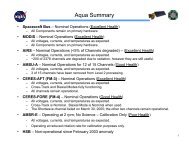Minutes of the Aqua Science Working Group Meeting - Aqua - NASA
Minutes of the Aqua Science Working Group Meeting - Aqua - NASA
Minutes of the Aqua Science Working Group Meeting - Aqua - NASA
You also want an ePaper? Increase the reach of your titles
YUMPU automatically turns print PDFs into web optimized ePapers that Google loves.
for approximately five minutes, and<br />
return to nominal attitude once per<br />
orbit. These yaw maneuvers would be<br />
centered roughly over <strong>the</strong> orbital South<br />
Pole, which is approximately 10-15<br />
minutes after <strong>the</strong> spacecraft experiences<br />
sunrise. Each orbit will have a different<br />
(incremental) yaw <strong>of</strong>fset currently<br />
varying from 16.5° to 0°. CERES, on <strong>the</strong><br />
o<strong>the</strong>r hand, wants to maneuver to a yaw<br />
<strong>of</strong>fset attitude <strong>of</strong> approximately 15° and<br />
hold attitude for roughly 35 minutes<br />
before returning to nominal attitude <strong>of</strong><br />
0° yaw. The beginning <strong>of</strong> <strong>the</strong> maneuver<br />
would be at approximately sunrise<br />
minus two minutes, so <strong>the</strong> maneuver<br />
back would be at approximately sunrise<br />
plus 33 minutes. CERES first wants an<br />
orbit sunrise at 0° yaw, followed by an<br />
orbit sunrise at 15° yaw, followed by an<br />
orbit at 0° yaw, and wants to perform<br />
this sequence twice. The MODIS<br />
sequence does not allow for 0° yaw<br />
orbits between <strong>the</strong>ir incremented yaw<br />
<strong>of</strong>fsets and does not want to sit in <strong>the</strong><br />
yaw <strong>of</strong>fset attitude for 35 minutes.<br />
Consequently, an additional maneuver<br />
sequence has been proposed to satisfy<br />
CERES solar calibration requirements<br />
and is currently under evaluation.<br />
Lastly, Amidon noted that <strong>the</strong> next <strong>Aqua</strong><br />
IMT Review is currently scheduled for<br />
October 17-18, 2000.<br />
After a short break and guided tour <strong>of</strong><br />
<strong>the</strong> <strong>Aqua</strong> Flight Operations Facility<br />
(narrated by Fran Wasiak), <strong>the</strong> meeting<br />
reconvened with presentations by Ed<br />
Masuoka <strong>of</strong> <strong>the</strong> MODIS <strong>Science</strong> Data<br />
Support Team and Bruce Barkstrom <strong>of</strong><br />
<strong>the</strong> CERES Team on Terra and <strong>Aqua</strong><br />
Data Processing Issues. Masuoka<br />
presented first on MODIS lessons from<br />
Terra regarding data systems and<br />
product release. He noted that a<br />
spacecraft design flaw has resulted in<br />
bit-flips in high data rate instrument<br />
September/October 2000 • Vol. 12 No. 5<br />
Level 0 data, and that <strong>the</strong> ground<br />
system lost capacity and robustness due<br />
to budget constraints. In July 2000,<br />
EDOS had hardware failures and<br />
capacity bottlenecks followed by<br />
difficulty processing Level 0 with bitflips<br />
in August 2000.<br />
From a science perspective, six months<br />
to a year are required to get releasable<br />
products after initial data acquisition.<br />
The performance <strong>of</strong> MODIS on orbit<br />
required calibration s<strong>of</strong>tware changes<br />
and <strong>the</strong>re were on average 10 science<br />
algorithm changes per higher level<br />
product (Level 2 and Level 3 products.)<br />
The performance <strong>of</strong> <strong>the</strong> data system and<br />
bit-flip problems resulted in days with<br />
large data gaps, and since products are<br />
now being released to <strong>the</strong> public, solid<br />
data days are very important. Additional<br />
problems with data ordering have<br />
been encountered, as ordering data<br />
using <strong>the</strong> EOS Data Gateway (EDG) is<br />
cumbersome, slow, and intermittent,<br />
and frequently leaves <strong>the</strong> user with <strong>the</strong><br />
impression that no products are in <strong>the</strong><br />
archive. Ano<strong>the</strong>r flaw in product<br />
ordering is that large data orders (15<br />
GB) do not get filled, but do not fail<br />
ei<strong>the</strong>r, so it is only later that <strong>the</strong> enduser<br />
is notified via email from DAAC<br />
user support. The Quality Assurance<br />
metadata update tool (QAMUT) needs<br />
substantial work to improve its efficiency<br />
in handling <strong>the</strong> updating <strong>of</strong> a<br />
large number <strong>of</strong> data sets.<br />
Next, Masuoka commented on <strong>the</strong><br />
current status and issues related to<br />
MODIS data production at <strong>the</strong> GSFC<br />
DAAC. He noted that some two-hour<br />
Level 0 data sets are truncated due to<br />
file transfer protocol (FTP) problems,<br />
and <strong>the</strong>y are unable to achieve robust<br />
processing <strong>of</strong> Level 1 products in <strong>the</strong><br />
GSFC DAAC as production problems in<br />
<strong>the</strong> EOSDIS Core System (ECS) release<br />
7<br />
5B are being manifested as gaps in <strong>the</strong><br />
Level 1 data products.<br />
MODAPS is processing <strong>the</strong> data that<br />
arrive from GSFC, and is currently<br />
running 10-30 days behind acquisition.<br />
MODAPS data production is exceeding<br />
A+ baseline (<strong>the</strong> average daily product<br />
volume and average daily number <strong>of</strong><br />
files that MODIS is allowed to store in<br />
each <strong>of</strong> <strong>the</strong> MODIS DAACs) for delivery<br />
and <strong>the</strong> MODIS <strong>Science</strong> Team is<br />
working closely with <strong>the</strong>m to prioritize<br />
production. Currently, <strong>the</strong> science team<br />
is making trades between keeping<br />
production near current day and<br />
processing complete days for time<br />
series. Delays in acquiring complete<br />
days (95% <strong>of</strong> Level 1) from EDOS/<br />
GDAAC is an issue and it is taking up to<br />
a month to fill holes in a day when<br />
EDOS reprocessing is required.<br />
Impacts <strong>of</strong> <strong>the</strong> current problems include<br />
having not processed all <strong>of</strong> <strong>the</strong> MODIS<br />
Level 0 data that has been acquired.<br />
There exist a large number <strong>of</strong> days that<br />
haven’t been produced due to system<br />
inefficiencies. The system is unable to<br />
produce consistently, even at 96 A+<br />
levels, mainly due to <strong>the</strong> incomplete<br />
delivery <strong>of</strong> Level 1 products to<br />
MODAPS, greatly hampering higherlevel<br />
product generation and validation<br />
efforts. Masuoka noted that <strong>the</strong>y have<br />
lost as many clear views <strong>of</strong> validation<br />
sites to “bit flips” and EDOS problems<br />
as to cloud cover. In addition, increased<br />
archive capacity is needed above <strong>the</strong> 96<br />
baseline to store higher level MODIS<br />
science products. Estimates were<br />
developed before any code was completed<br />
and is now inadequate to store<br />
<strong>the</strong>se MODIS products.<br />
A delay in production <strong>of</strong> complete Level<br />
0 products for data days has held up<br />
downstream production at GDAAC and





